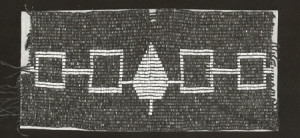Fall 2018 - FNST 325 J100
History of Aboriginal Peoples of North America to 1850 (4)
Class Number: 8487
Delivery Method: In Person
Overview
-
Course Times + Location:
Sep 4 – Dec 3, 2018: Thu, 5:30–8:20 p.m.
Vancouver
-
Instructor:
Maddie Knickerbocker
mknicker@sfu.ca
-
Prerequisites:
45 units including FNST 101 or 201W.
Description
CALENDAR DESCRIPTION:
Examines selected themes in the history of Aboriginal peoples of North America from first contact with Europeans to the mid-nineteenth century. Students with credit for HIST 325 may not take this course for further credit.
COURSE DETAILS:

Hiawatha wampum belt, mid-eighteenth century, Library of Congress, Washington DC
North American Indigenous history is a dynamic and engaging field of study, one which has seen considerable development even in just the past twenty years. This course seeks to offer an introduction onto this complex field, providing students with the historical context they need to understand not only the past experiences of Indigenous peoples up until 1850, but also the legacies those histories have in the twenty-first century.
Because of the expansive breadth of time and space the course covers, we will take a thematic approach to engaging with Indigenous histories in North America leading up to the middle of the nineteenth century. Course units focus on the sources of Indigenous historical knowledge, Indigenous histories before contact, and Indigenous-settler relations. After taking this course, students will be able to: identify broad-level continuities and changes in Indigenous cultures up to 1850; describe similarities and differences between Indigenous groups from across North America; and discuss how Indigenous individuals, even those within the same community, responded differently to colonialism.
Students will work throughout the semester to prepare for their final projects, which will be the creation of new Wikipedia articles about Indigenous issues, events, or individuals in the period prior to 1850. We will have workshops on using Wikipedia correctly to attribute academic knowledge and share it with the general public. Assignments will be scaffolded, so that early work can support the final product.
Grading
- Participation 10%
- Point Paragraphs 10%
- Annotated Bibliography 15%
- Preliminary Draft 25%
- Final Wikipedia Entry 40%
Materials
REQUIRED READING:
Olive Dickason and David McNab, Canada's First Nations: A History of Founding Peoples from Earliest Times, 4th ed.
Gregory Younging, Elements of Indigenous Style: A Guide for Writing By and About Indigenous Peoples
Department Undergraduate Notes:
- Deferred grades will be given only on the basis of authenticated medical disability.
- Students requiring accommodations as a result of a disability must contact the Centre for Students with Disabilities at 778-782-3112 or csdo@sfu.ca.
- Remember to check the Student Information System (SIS) at the start of the term to reconfirm your classroom location(s).
- All students are expected to read and understand SFU policies with regard to academic honesty and student conduct (S10).
These policies are available at: http://www.sfu.ca/policies/gazette/student.html - On occasion, announcements will be sent from first_nations@sfu.ca to your SFU email.
Department of First Nations Studies- Contact Info:
Webpage: www.sfu.ca/fns.
General Office: Saywell Hall (SWH) Room 9091. Burnaby Campus. (M-F, 09:00-16:30 Hrs.)
For general information, program information, academic advising (appointment or program check-up; enrollment assistance*): Please email fnstmgr@sfu.ca.
* Students: When submitting a request or an inquiry, please email from your SFU Mail (@sfu.ca) email and remember to include your SFU Student ID number in your email. Thank you.
Registrar Notes:
SFU’s Academic Integrity web site http://students.sfu.ca/academicintegrity.html is filled with information on what is meant by academic dishonesty, where you can find resources to help with your studies and the consequences of cheating. Check out the site for more information and videos that help explain the issues in plain English.
Each student is responsible for his or her conduct as it affects the University community. Academic dishonesty, in whatever form, is ultimately destructive of the values of the University. Furthermore, it is unfair and discouraging to the majority of students who pursue their studies honestly. Scholarly integrity is required of all members of the University. http://www.sfu.ca/policies/gazette/student/s10-01.html
ACADEMIC INTEGRITY: YOUR WORK, YOUR SUCCESS